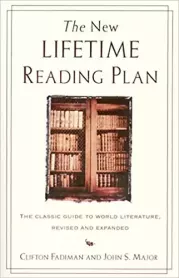Clifton Fadiman, John S. Major - The New Lifetime Reading Plan
 | Название: | The New Lifetime Reading Plan |
Автор: | Clifton Fadiman, John S. Major | |
Жанр: | Старинная литература | |
Изадано в серии: | неизвестно | |
Издательство: | неизвестно | |
Год издания: | 1999 | |
ISBN: | неизвестно | |
Отзывы: | Комментировать | |
Рейтинг: | ||
Поделись книгой с друзьями! Помощь сайту: донат на оплату сервера | ||
Краткое содержание книги "The New Lifetime Reading Plan"
Now in print for the first time in almost 40 years, The New Lifetime Reading Plan provides readers with brief, informative and entertaining introductions to more than 130 classics of world literature. From Homer to Hawthorne, Plato to Pascal, and Shakespeare to Solzhenitsyn, the great writers of Western civilization can be found in its pages. In addition, this new edition offers a much broader representation of women authors, such as Charlotte Bront%, Emily Dickinson and Edith Wharton, as well as non-Western writers such as Confucius, Sun-Tzu, Chinua Achebe, Mishima Yukio and many others. This fourth edition also features a simpler format that arranges the works chronologically in five sections (The Ancient World; 300-1600; 1600-1800; and The 20th Century), making them easier to look up than ever before. It deserves a place in the libraries of all lovers of literature.
Читаем онлайн "The New Lifetime Reading Plan". [Страница - 5]
Such weighty considerations aside, the Epic of Gilgamesh is well worth reading as a story of love and friendship, of adven- ture and danger and grief, and of a proud man^ humbling encounter with mortality. The epic is now available in several fine English versions; I particularly like the verse translations by Danny P. Jackson and by David Ferry.
J.S.M.
2
HOMER
ca. 800 B.c.E. The Iliad
The Iliad and the Odyssey are two long, ancient Greek narra- tive poems called epics. They are the first as well as the great- est epics of our civilization. Every time we refer to a siren or Achilles^ heel or compare a lovely woman to Helen of Troy we are borrowing from these poems that are perhaps three thousand years old.
I say perhaps. We do not know when Homer lived—maybe between 800 and 700 b.c.e., maybe earlier. As a matter of fact we do not even know whether he lived. We do not know whether the stories were written by one man named Homer; or, as the old joke has it, by another fellow of the same name; or by a syndicate; or even, as Samuel Butler thought in the case of the Odyssey, by a woman. These questions are for scholars. The poems are for us.
Originally, it is supposed, they were listened to rather than read. Homer, whomever he or she was or they were, recited them.
The Iliad tells the story of some fifty days of the last of the ten years' siege of Troy (or Ilium) by a number of tribes we loosely call Greeks. This siege resulted in the capture and firing of Troy's "topless towers," which we know to have actually existed. To find out how Troy was taken, see VirgiPs Aeneid [20].
The Iliad is probably the most magnificent story ever told about man's prime idiocy: war. The human center is Achilles. The main line of the narrative traces his anger, his sulkiness, his savagery, and the final assertion of his better nature. He is the first hero in Western literature; and ever since, when we talk of heroic qualities, Achilles is somewhere in the back of our minds, even though we may think we have never heard of him.
You can look at the Iliad through a diminishing glass. Then it becomes the story of a trivial scuffle, marked by small jeal- ousies and treacheries, fought by long-dead semibarbarians who had hardly advanced beyond the sticks-and-stones era. The wars of The Iliad, compared with our splendid planetary slaughters, are petty stuff
Strangely enough, when you actually start to read the Iliad the lens of this diminishing glass changes and becomes a mag- nifier. The scale of the war becomes unimportant; the scale of the men and the gods enlarges. The essential quality of the Iliad is nobility. Nobility is a virtue connected with magnitude; there are no small nobilities. General Eisenhowers Crusade in Europe was a useful book, portraying the largest single military and naval exploit in ali history. Yet, compared with the Iliad recounting a local struggle of little historical importance, it lacks magnitude. This is no reproach to General Eisenhower. He was no Homer.
And there never has been another Homer. If a reading of the Iliad and the Odyssey does nothing else for us, it makes us reflect on the difference between art and science. There has been "progress" in the latter; there is none in the former. Ali imaginative artists, but only if they are great enough, seem contemporaries. That is the way to read them.
C.F.
MOMER
ca. 800 B.C.E. The Odyssey
The Odyssey is a kind of sequei to the Iliad. It tells what hap- pened to the Greek heroes after the sack of Troy. More espe- cially it follows the fortunes of one of them: Odysseus, King of Ithaca, also known as Ulysses. It describes what happened to him during his ten years' long voyage home; the search of his son Telemachus for his father—a theme repeated in hundreds of novйis since, such as Joyce's Ulysses [110]; the arrogant woo- ing by the suitors of his patient wife, Penelope, during his absence; Odysseus's return; and his bloody revenge on his ene- mies. The story is well known even to those who have never read it. Like the Bible, it is less a book than part of the perma- nent furniture of our minds.
When we take up the Odyssey after the Iliad we step into a different world. Even its sound is different. That of the Iliad is clangorous with the clash of arms; that of the Odyssey, mur- murous or thunderous with the myriad-mooded sea.
But the difference is more basic. The Iliad is tragic. It announces a theme repeated in Western literature ever since, and one that obsesses our own private minds: the limitations of even the noblest spirits in the face of a world seemingly gov- erned by unchangeable Fate. But the Odyssey is not tragic. It stresses not our limitations but our possibilities. Its theme is not courage in the face of death, but intelligence in the face of hardship. It announces another of the great themes: the power of intelligence, a theme to which we modems readily respond. Though Odysseus is brave enough, his heroism is of the mind. He is not outsized in passion, like Achilles, but of human dimensions, like us.
The tone of the Odyssey corresponds to this more homely conception of man. While full of fairy-tale episodes, it
impresses us as does a realistic novel; indeed it is the first of ali realistic novйis, as it is the first of adventure stories, and still perhaps the best.
It is in this spirit that we may read it today, as a narrative of adventures that happened to an unusual man whose mind never stopped working. The mood of the Odyssey is more relaxed than that of the Iliad. And so should ours be as we read it.
C.F.
4
CONFUCIUS
551-479 B.C.E. The Analects
For many people in the modern West, the most difficult step in reading and appreciating the Analects is to get beyond the stereotyped image of Confucius himself as a quaint oriental gentleman speaking in fortune-cookie aphorisms. His name was not Confucius, of course; that was bestowed on him by Jesuit missionaries in the seventeenth century, a time when, for Europeans, every respectable philosopher needed a Latin name. (Confucius is a Latinized form of ICung-fu-tzu [pinyin Kongfuzi]1—meaning 'Great Master K'ung/)
His family name was K'ung, his personal name Ch'iu [Qiu]; he came from an old and respected family of the lower nobil- ity, the class that in the medieval West would be called knights or chevaliers. He grew up as an expert archer and charioteer, a man of vigorous action as well as exquisite manners. He lived in a time of great social and political change, when the old


